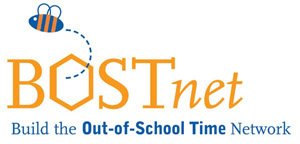
What do you get when you combine about 150 afterschool and out-of-school time providers, a couple legislators, a specialist in developmental pediatrics, innovative workshop presenters dedicated to inclusion, two Olympians and a real life Olympic Gold Medal? The 4th Annual All Means All Conference!
It is clear from the comments we have received from attendees that this year’s conference once again provided program staff with hands-on strategies and opportunities to network and learn together as a field:
· “Fantastic – keep the information coming!”
· “Very well organized”
· “Excellent”
· “Outstanding!!! So motivational and inspirational”
· “Great energy/thought provoking”
· “It was a great day of learning for me. I have walked away pregnant with ideas!”
· “It was awesome. I really enjoyed myself”
· “Great presenters, tons of useful information/networking!”
· “Excellent new workshops and presenters!”
Typical for BOSTnet’s professional development and networking events, attendees represented the entire span of OST providers, from first year direct service staff to program coordinators and executive directors with over 20 years experience. Of the 50 attendees who reported on how many years they have worked in the field the average was 6.5. This is significant because it reflects the importance of continuing education and peer learning in the field. As one six-year veteran noted, “I got refocused on meeting our kids where they are.” It also highlights the need for BOSTnet to outreach more aggressively to newer staff who are looking to network and need basic training to better prepare them for the school year. Attendees responded positively to new workshops offered on brain development and reading skills by Children's Hospital, Boston; inclusive literacy activities by ReadBoston; children exposed to trauma by Project Joy; and working with physically disabled children by Piers Park, Adaptive Sailing Program. Among the topics that respondents reported they would like to see include, diversity training and cultural competence, activities and curriculum on building the social skills of children with disabilities, and working with children with mental health issues, such as bipolar and obsessive compulsive disorders.
BOSTnet wishes to thank everyone who contributed to the success of this year’s All Means All Conference. It has become clear to us that this is a special and unique event. We are unaware of other ongoing conferences – nationwide – that are dedicated, specifically, to the goal of increasing the capacity of afterschool and out-of-school time programs to include children and youth with physical disabilities, developmental disorders and behavioral problems. We wish to thank our generous supporters who continue to make this event possible: The Boston Foundation; The Damman Boston Fund; Northeastern University’s Center for the Study of Sport in Society; and, The Disability Inclusion Initiative of the Carl and Ruth Shapiro Family Foundation.

BOSTnet would like to thank our opening session speakers, including Eli Wolff, a longtime supporter of All Means All and a leader who always inspires us to think of inclusion as social justice and what it means to be human in society; Senator Thomas McGee and Representative Marie St. Fleur who have emerged as champions of the afterschool and OST field and who are quick to challenge us to be more innovative and collaborative during a time of fiscal uncertainty; and Dr. Alison Schonwald who provided us with very thought provoking information on developmental disorders in a very clear and understandable way. We would also like to thank all the workshop presenters, many of who are veterans of All Means All, who do the important work of teaching program staff new strategies for creating engaging learning environments for ALL children, especially those with special needs.
A very special “shout-out” is due to Michal Shapiro and the BCYF’s Urban Youth Leadership Corps Peace Fellows. These energetic and engaged youth were a huge help with registration and they provided additional insights into the workshops by providing critical reviews of the presentations. The Peace Fellows will be working with the Center for the Study of Sport in Society’s Project Teamwork to be trained in violence prevention and diversity awareness. They will be using these skills to provide peer mediation and conflict resolution in community centers and schools. Thank you and best of luck on this important project. We know you will continue to grow as leaders through your experiences this year.
As always, this is one of the few events we have to see old friends and meet new ones. As we look toward next year we are already considering ideas to improve the 5th Annual All Means All Conference through broader collaborations, new perspectives, and an expanded offering of workshops. Please stay tuned and check www.bostnet.org often. To watch video excerpts from the opening session, click here.




